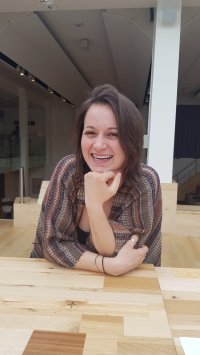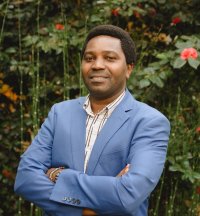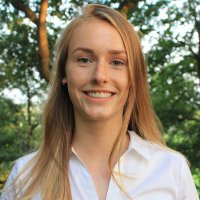© Henk van Ruitenbeek

Xun Yuan, MSc student of Organic Agriculture, from China
‘I feel that I’m in parallel worlds that don’t necessarily overlap, at least in day-to-day life. A big part of it is down to me coming from a very different culture – I wasn’t brought up to be outspoken, but opinions are definitely valued much more here than in China, so it can be hard for me at times, both inside and outside the classroom. But I’m finding my voice – I guess being exposed to new cultures does change people in ways I haven’t thought about before.
Before I came to Wageningen, I wasn’t aware of the many “shades of green” in the sustainability movement. It also really opened my eyes to see so many vegetarians or vegans around me, who are trying to do what’s good for the environment in their own way. So, on another level, maybe we are One World after all: despite our different cultural quirks, we’re all doing our bit for the planet.’
Iris van Hal, MSc student of Forest & Nature Conservation and Development & Rural Innovation, from the Netherlands
‘To me, Wageningen is very much ‘one world’ because of the highly diverse international classrooms and group work. I have many international friends, both within and outside my degree programme. So I interact with people from all over the world when I study, as well as when I play sports or take part in activities. I really like the way you get introduced to so many different cultures. For example, if you go to a potluck, you can try all different kinds of food from all over the world.’

Lizzie Freed, MSc student of Organic Agriculture, from the US
‘Instead of a melting pot, I think we’re more of a tossed salad here. Since we’re only students here for a limited period of time, the mindset is less geared to integrating with the dominant Dutch culture than it would be if we moved here permanently.’
I think it’s more of a tossed salad than a melting pot
Lizzie Freed, MSc student of Organic Agriculture
‘But having said that, the university is doing a great job of making people from different cultures feel welcome and I’ve definitely had great conversations in class when we were discussing problems from different global perspectives.’
Gert-Jan Hofstede,
Personal professor of Artificial Sociality, from the Netherlands
‘Compared with other universities, Wageningen is quite strongly ‘one world’. I think it’s because we have a rich mix of students from all sorts of backgrounds here, spread over various degree programmes. It would be very limiting for foreign students if they only socialized with people of their own nationality. Of course there are smaller groups that communicate with each other in their own language, but that’s no problem. It makes people feel secure. I think the Wageningen culture has always been very tolerant, but that it took a bit of getting used to. Last year I was at a drinks do at one of our study associations, which was once a bastion of Dutch students. Twenty years ago, you got little cliques there that didn’t want anything to do with people who spoke other languages. But that probably came from fear of having to speak English, and not from intolerance. Now you see people from all around the world there, and they are completely at home.’

Joshua Wambugu, On the Student Council and the One World Week team, from Kenya
‘Wageningen is certainly one world. There are over 100 nationalities here. This shows that Wageningen is willing to welcome different nationalities. One World Week is a platform for students and employees to learn from each other, get to know each other’s cultures, and have fun. But even without this week, Wageningen would still be a One World environment. You can see this in the international classroom and the social interaction of students outside the classroom.’

Puck Stamps, Student Affairs officer at the Student Service Centre, from the Netherlands
‘As part of my work, I deal with registration of students from all around the world, but I don’t see much of the subsequent interaction between them – not in my work, at least. Walking around the campus I often see little groups of Italian students or perhaps a couple of Chinese students deep in conversation. So they definitely do seek each other out. But I also often see mixed groups of students, so they seem to link up too. Hopefully this will happen more often, not just among international students, but also involving our Dutch students.’
Suzan van de Rijt, Vice president and secretary at IxESN, from the Netherlands

‘At IxESN, I see so many cultures and nationalities. We try to make everybody feel at home here, no matter where they come from. It is a real One World community. Even the Dutch students contribute to that community, especially after they’ve been on an exchange. Look at the Dutch students who become buddies for international students, for example. Buddies show new international students around, and they participate in fun activities together. Close friendships are formed this way. After my own exchange in Reading, England, I became a buddy as well, and since then, my group of friends has been a lot more international.’
Lees meer:
Soundbites: How ‘One World’ is Wageningen really? (video)
One World Week kicks off with the Whole World on Catwalk (photos)
